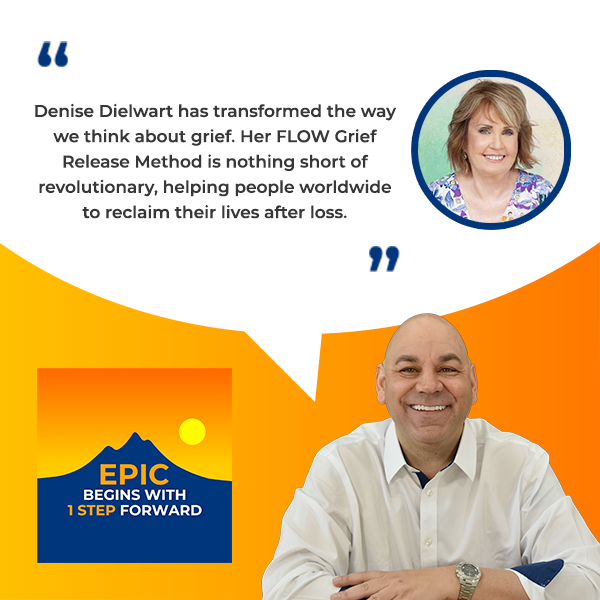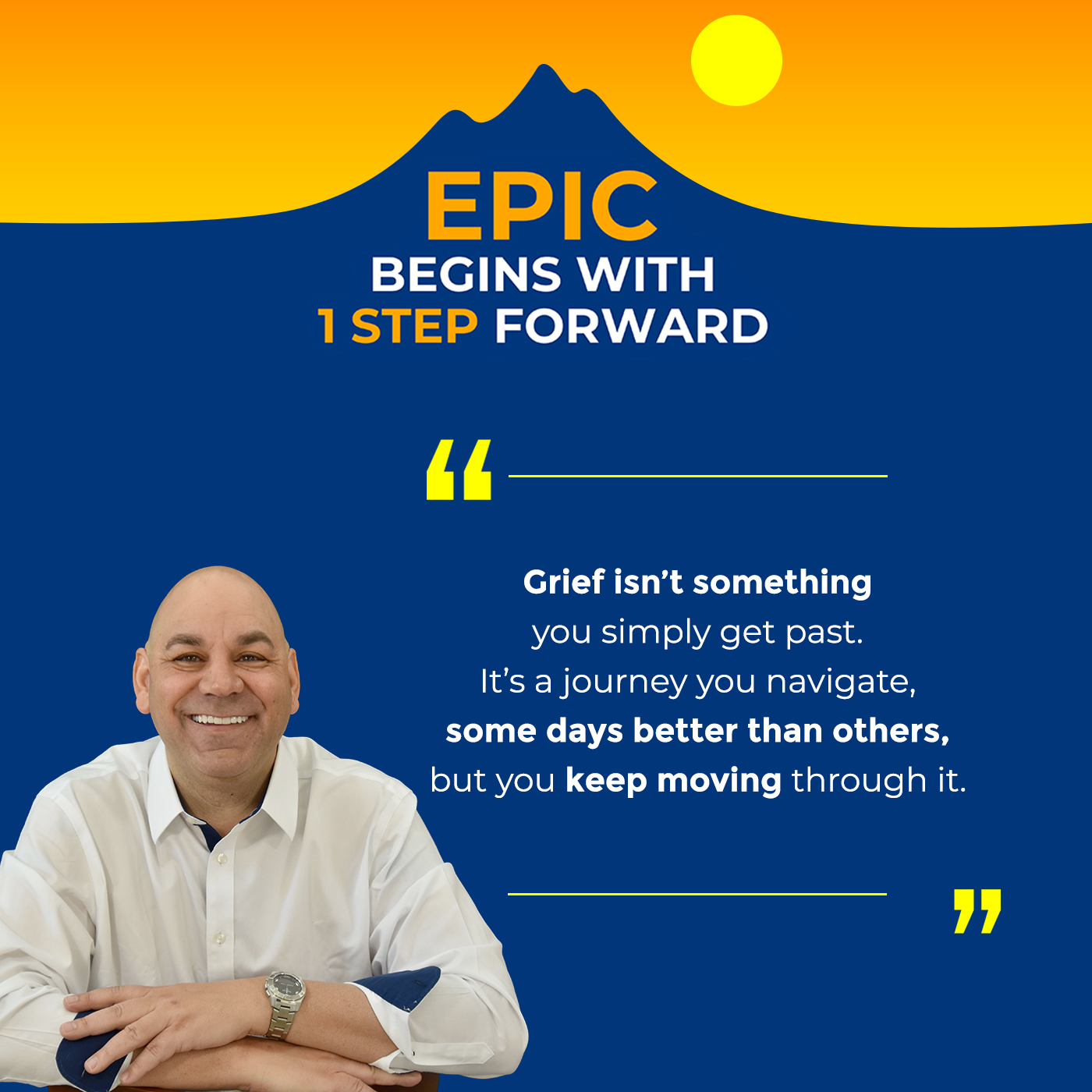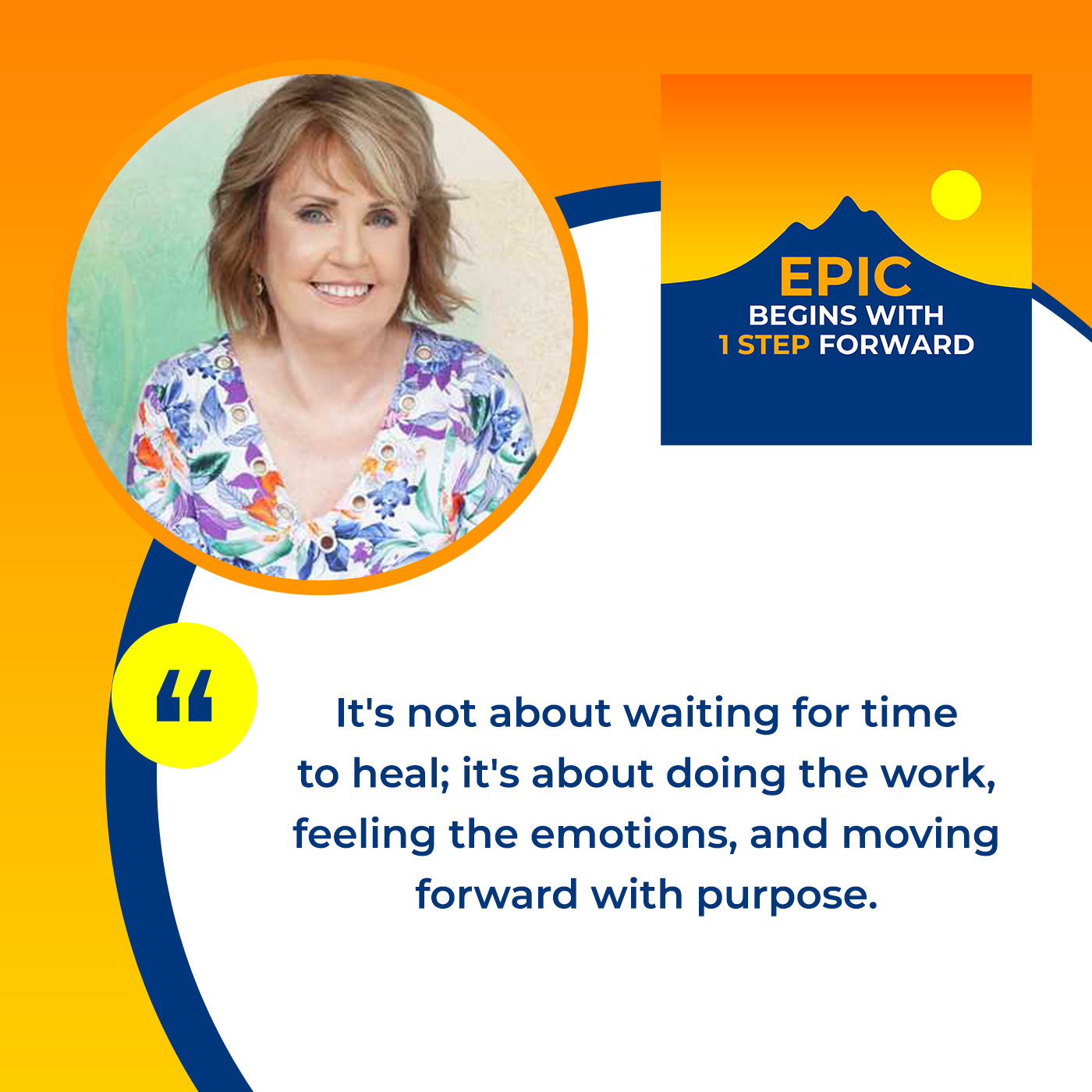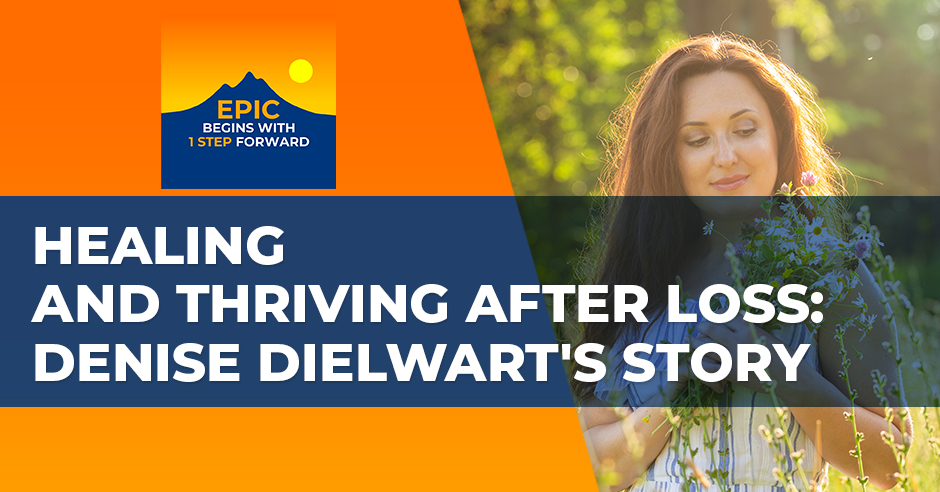—
Watch the episode here
Listen to the podcast here
Healing And Thriving After Loss: Denise Dielwart’s Story
Introduction And Denise’s Background
I am joined by Denise Dielwart. I want to thank you very much. Tell us a little about who you are and what you do.
Hi, Xander. Thank you very much for having me on and inviting me to your podcast. It’s an absolute honor to be here. As you said, I’m a widow. I lost my husband in 2009 very suddenly to a blood clot, which spiraled me into what I do now, helping other people in grief and helping other people to realize that grief is not a life sentence.
That losing a loved one is growth. It’s not that it is a loss. It is a sadness, but it’s a whole new life that starts and it’s your life. It’s our life. That’s where I started. It was in 2009, just realizing and having to go through that pain and that loss and that growth because sometimes it just takes that for us to realize our magnificence and how great we are.
I am sorry for your loss. I lost my older sister 27 years ago. I can understand the depth and breadth of all of that. I have to say, I too agree that although it’s not anything we want to go through, the loss does sometimes help us discover new things about ourselves. We discover our resilience. I think we’re all very resilient, but sometimes we forget how resilient we can be and we are.
In loss, we lose ourselves in a widow situation, as in a couple situation. What I find with a lot of widows is that they lose themselves in the marriage. You become one. Same as widows. When the other partner dies, they don’t know who they are. It’s not only widows, it’s when you lose a child or you lose a sister because your identity changes. Your role changes. Who am I now without that person? Unfortunately, what society expects us to do is just carry on as though we’re just the same person. Nothing’s changed. Everything’s the same. Just get over it and you’ll be okay.

In my experience, Denise, after a while, people were very sympathetic when it first happened, but I did have one person who I know who said, “Aren’t you over it?” I said, “I will never get over the loss of my sister.” When I’m talking about sibling loss or loss in general, I say, “We’re working our way through it, some days better than others.”
You’re not going to get over and I’m going to put in quotes, “Over losing your husband.” You don’t get it, you don’t get over it. You find ways that you’re able to incorporate that loss into your life. Some people don’t. Some people just get stuck at that loss. I know that some of the work that you’re doing is to help people, I believe, not be stuck.
You don’t ‘get over’ loss. You incorporate it into your life and continue moving forward.
Overcoming The Victim Mentality
Just what I was going to say, is that’s where I come in because I realized that it’s very easy, and I’m sure you have experienced the loss of a loved one as your sister. It’s very easy to be the victim. “Look at me. Poor me.” “Look what happened to me. My goodness. It’s not fair.” “Life’s not fair.” “Why did this happen to me?” “Why me?”
I had a beautiful 84-year-old widow friend of mine. Her husband had just passed away and they’d been together for 60 odd years. We were sitting around her kitchen table and she said to me, “Why me? It’s not fair.” I just looked at her and I just said, “Why not you?” Everybody’s going to die. We’re all going to die one day but society just blanks it out and says, “Do you know what? We don’t want to see that. We don’t want to hear that. It doesn’t happen.” We’re not shown or taught how to accept loss.
You’re right. We are not. I know a little about Australia and I’ll say from what you’ve said, here in the United States, we don’t deal with death very well. We treat it it’s the most communicable disease in the world. “My gosh. You’ve experienced death. I can’t talk to you because that might rub off. I might get death.” Of course, that’s not the way.

You’re exactly right. We are all going to experience loss in our life. Doesn’t make it easier, but it’s going to happen. Death and taxes. Those are the two guaranteed things in life. We are, at some point, going to die. Some cultures and religions have processes around death that may make it a little easier. There’s something I know about the Jewish religion. They sit shiva. Different cultures frankly deal with death a lot better than I’ll say the Anglo-Saxon community.
In Australia too, when I started, I worked only with widows because that’s what I knew. I now work with everybody and realize that everybody needs help, not just widows. What I found with the widows too. What’s common is, and you touched on it as well, it happens to everybody. When we lose our loved ones, everybody rallies around us. “I’m sorry. What can I do?” They bring meals. They’re at the funeral. They’re at the wake afterward and everybody’s there for you. “Let me know what I can do.” Then, it’s crickets. Everybody disappears.
Yes, it’s falling off a cliff. There are too many people around and then, all of a sudden there’s no one around.
That’s right and then you start asking yourself, “What did I do wrong?” “Who did I offend?” What gets missed is that our lives have changed. Theirs hasn’t. They just jump back into their life and say, “That’s such a sad thing that happened to Xander.” “That’s a sad thing that happened to Denise.” “He lost his sister.” “Denise lost her husband.”
However, they’ve got their kids. They’ve got their families. They’ve got everything that is still working. Any life carries on. Then, they might bump into you one day, maybe down the track and they will say, “How’s it going?” In my case, I had a work colleague six months after Martin passed away. I bumped into her at the store and she said, “I’m sorry to hear Martin’s passed away. Have you got a new man in your life yet?”
That’s what’s expected in society. It’s like, “Okay, you break up with that one. That one’s gone. Now you go get a replacement.” I was taken aback and said to her, “No.” She said, “Haven’t you got over him yet?” That’s what expected. We just get over it. We just go through that loss and even in the workplace, when somebody loses somebody in the workplace, you get bereavement leave and that’s it. Now, you’ve got to come back and you’ve got to perform 110% again. It doesn’t work. The brain is mush.
You can’t be expected to perform 100% right after a loss. Your brain is mush, and that’s okay.
I think I’ve had a long time to think about this experience and I’ve written two books about sibling loss. I talk about it, along with my epic stuff but there are a couple of things at play here. You’re right. First of all, five days of bereavement leave is ridiculous because frankly, that whole time is taken up just trying to make arrangements.
Luckily, I was back at work because sitting in my apartment wasn’t any good. I’d rather be around people. I had an exceptional manager who gave me the space. I probably went in for about a month and pushed the paper around. I did some work, but I was not by any means productive. He was supportive in understanding that I was doing the best I could.
I think the other thing about, “Haven’t you moved on?” Haven’t you, whatever. I’m sure you experienced this, Denise, where let’s say you’re going to a social event or something after Martin passed away. You put on your, I call it, “You’re grief armor.” You’re ready for people to talk to and no one talks to you. No one acknowledges your loss and you have this feeling of, “I was ready and no one talked to me.” I experienced that. I remember at a memorial service for my sister probably about six or seven months after my sister was murdered. I
It was a summer community on the East Coast of the United States where my family had a house and a lot of those people hadn’t been able to come in so we were having a service for the community. I got up and spoke, “You don’t have a miracle sentence that will make it better for me and I don’t have a miracle sentence for you but that’s okay. Still, talk to us. Share stories.” You’re right.
The Emotional Rollercoaster Of Grief
You’re not going to say the wrong thing and even if you do and I cry, understand that it’s all part of this process of working our way through the grief and love. Sure. You experienced this where you’ll say, “I’m doing well.” Something can happen. It could be a song on the radio. It could be a smell. It could be going someplace. All of a sudden, you feel like you’re right back at the beginning for a day or two. As my dad called it, “The train came off the tracks.”
The thing is that in society, we are taught and unfortunately, it’s become the norm that, “Time heals all.” Just wait for time. “You’ll be okay. Just wait.” Then, we go and see a grief therapist or a grief counselor, and they are then taught the five stages of grief. The five stages of grief keep people stuck because it’s, “I’m not angry. What if I go into this stage?” “What if I’m not in that stage?” Grief is grief.
I don’t even know what the stages are because I don’t buy into them. It’s anger, depression, or whatever. Grief is grief. You need to feel that pain. You need to go through those emotions. People to acknowledge us and those emotions you said. Just say something. Talk about it. Remember the good times. Remember the funny times. Remember the bad times.
Do not canonize. Someone dies and all of a sudden, they canonize. I love Lucy very much. She was a great person, but she was by no means a saint or an angel. There were times when she was mean and was a jerk to me.
She’s human.
We talk about it and then people say, “You can’t say anything bad.” I encourage people to tell me stories. I learned much about my sister that I would never know if I didn’t permit people. Share stories, and it doesn’t matter if it’s a bad story because I’m learning about this person who’s very significant to me. It is how we keep them alive in our life. If we don’t talk about them, we don’t acknowledge their life. Another thing that I share with people all the time is, my sister was 30. How old was Martin?
You never forget those you’ve lost, but you learn to live and thrive with their memory in your heart.
Fifty-five.
There’s a beautiful 55-year rainbow that was Martin’s life. It’s right. Why focus just on the dot that is the end of his life and not remember and celebrate? I celebrate Lucy’s 30 years and the stuff that she did and who she was, the good, the bad, the ugly, the warts, and all. For me, it is much more rewarding. I’m not ignoring the fact that my sister isn’t here. Just not perseverating on the fact that she’s dead.
This is the thing, it’s not acceptance. You never accept it. You never reach at all till there’s this acceptance at the end of it. When we go through major changes or we change something majorly in our life, that person is still there. three years ago, I sold our forever home. I didn’t want to let go of it because it was our forever home that we built together.
It was on acreage. That was up north, in Central Queensland and we had a motorbike track out the back for the grandkids and it was Martin’s haven. I clung to that. It was the last thing. I had tenants there. I moved around and did what I wanted to do but that was the last bastion of Martin. That was the last thing.
Three years ago, I went back and I thought, “No, I’m going to go back into the house.”When I got to the house, I thought, “What are you doing here?” You’re on eight acres by yourself. You can’t see your neighbors. This is not my life anymore so I sold it. The emotional trauma of selling that house was grieving that loss all over again.
Even though I’ve done all the work, I’ve got all the tools, I know what to do, I still had to go through those emotions and feel them. That was fifteen years now, so it was 12 or 13 years ago that he had passed. To accept somebody to go through the five stages of grief, wait for time, and now you’re okay, get on with your life. It doesn’t happen that way.
I’ll counter a little and say that I think there may be more than five stages of grief. I think it’s a very fluid thing. As I said, you could be up at acceptance and all of a sudden be back at abject grief because you heard something on the song on the radio or something. I do think from a psychological standpoint, structure helps people, especially when you feel just getting out of bed is the biggest effort.
I do agree with you that it’s not like, “I’m working my way through.” I think it’s very fluid. I do think that the structure of the stages of grief is helpful for people to understand where they may be. People like structure. It helps us, especially when we’re feeling as lost as I know I felt and it sounds like you did after your loss.
I think there are those emotional things that you have to do. I know we took Lucy’s stuff from her apartment and we had it in the storage unit for ten years and I didn’t go to the storage unit all the time and go through her clothes or whatever. My parents were moving and we were asking what are we going to do.
My mom and I went over to the storage unit and the two of us thought, “Why were we holding on to this?” I got that at the time, now Lucci’s clothes are out there for ten years in a box in a storage unit. No one wanted them and it was sad. I think time is not that it heals much as you now have better tools to deal with it.
I talk about it in my first book. It’s like a cubbyhole in our life. There are things that we can take in and out. The day you got married or if you have children, the day your children were born or whatever. That’s, “Let me take that out. That’s great.” Then, you can put it back in. When we experience a loss, it is like a life raft. You pull it out and it takes up everything.
That’s right. You see, with my flow method, that’s the structure that takes us through what we do within that time. It’s not just sitting back and waiting for time.

No. There’s work to be done.
There’s work to be done. You talk about a storage unit. There was this poor woman when I started working with her. She didn’t know up from down, sideways from anything because she discovered after her husband passed away that he had another whole family in another country that she didn’t know about. She had a betrayal. She had the loss. Plus, he left her with no money. She was couch surfing.
What happened? He went away for business and he said, “While I’m away, sell the house and when we come back, we’ll buy a new house.” It is because they were in the process of buying a new house and the house was sold while he was away. The money went into the joint account, she didn’t bother to check it. After he died, she went in and it was empty. There was nothing there.
She found herself couch surfing. Within the 1st week of us working together, she had struggled for about five years before that. Within the 1st week of our working together, she went to her storage shed and cleared it out. She said that now she had the tools. She rallied a whole lot of friends around and she said that she could then face all his stuff in the storage shed. She was selling TVs out of her boot.
It does feel hard but for those readers who may not have experienced a big loss like this, let me put it this way. We all have a time where we have to go through our clothes and for whatever reason, you need to get rid of stuff. I like T-shirts and I’ve gotten better at this but I used to have a ton of T-shirts. They were talismans of where I’d been, what I’d done, and good times.
Any t-shirts that I had from my university days that I moved from coast to coast multiple times. Never wore them, but I had this thing of, “I don’t want to give this up.” I remember when I went to this place and it was fun and it was but here’s the thing, I’m not wearing a T-shirt. It’s taking up space in my drawer and I have all of those memories in here. I don’t need the t-shirt. The T-shirt is just a clue.
I can take a picture of it and say, “Here’s the t-shirt of when I went to this place.” Now, I can have all those memories. In the same way, when we lose someone, it is hard. “Here’s the rug that we bought and we’d look long.” If you don’t need it anymore, there is actual goodness in saying, “I need to let go of these things because they are no longer who I am, what I am, or where I am.”
Letting Go And Moving Forward
That’s right. We have to let go. That is such a common question, “When do I clean out their closets?” My answer always is, “When you’re ready.” There is no time frame. There’s no within 6 months or 4 months. I’ve had ladies who lost a child and ask, “When do I clean their room out?” “When you’re ready.
You don’t have to throw everything out, but we certainly didn’t need all of Lucy’s clothes.
She’s not going to wear them again.
We didn’t need the furniture that we moved. She was in Chicago at the time. My parents were living in Boston. We moved it because we had to get it out and what are we going to do with it? Certainly, her desk lamp was not anything any of us needed anymore. “Let’s donate it.” “Let’s find a way that it’s no longer our possession.” Either it goes to the landfill or you’re able to let someone else utilize it and give it more life. Some stuff just needs to get thrown out because you can’t donate it.
They would’ve thrown it out anyway but we hang on to it because we have that memory. It’s a memory that’s attached to that thing. We think that if we hang on to that thing or we let go of that item or that thing, we’re going to forget about them. We’re going to forget about the memories.
Are you going to forget about Martin?
Never.
Exactly.
I always say to my widows and I’ve had a lot of them that have worked through the program with me and worked with me. I’ve got to the stage where they’ve moved forward, they’ve got another man in their life, and life is happening. Suddenly, they say, “He’s starting to feel a bit out because I still talk about my late husband. I always say, “You got to let him know that he’s in a threesome.
It is because your husband and you didn’t have a bit of a divorce, you hated each other, and he’s still alive. He’s not there anymore and he will always be in your heart but in a different heart of your heart. Not that same heart. The person you’re with is not your husband and you know that. That’s why you’ve moved forward.
I know that Lucy is in my heart. She’s a big part of my life. It’s a big part of why I do this with the siblings and stuff because sadly, siblings’ grief is not acknowledged. Part of the work I do is trying to raise awareness to say that when a child dies, everyone asks how my parents were, but no one asks how I was.
That’s right. It’s the same as when a husband does. Everybody asks how the wife is, but not how the children are. They lost their dad. If you lose a child, you’ve got other children as well who are feeling that loss.
Yes, that’s why the second book I wrote, which is called Why Don’t They Cry?: Understanding Your Living Child’s Grief. I wrote it because many parents came up and said, “I lost a son or daughter, but I have other living children. Xander, you talk about this all the time. Help me understand.” I thought I needed to write a book that tries to explain some of what’s going on. I’m explaining the sibling survivor experience.
I’m just talking about not only my experience but the experience of other siblings that I’ve worked with. Understand that there are changes, that there’s what I call, the new family. I was the middle child. I have a younger sister. I have my older sister. Technically, I’m the oldest child now. There are expectations for the oldest child and I never had those.
Yes. That’s when your role changes. Your identity changes.
Yes, all of a sudden, not that you weren’t always the head of the house, but now I’ve got to deal with all of these things and any relationship, there’s that division of labor where Martin’s taking care of this, you’re taking care of that. You’re not paying attention because Martin’s taking care of it. Whether they fall on, I’ll say, traditional gender roles.
We had a very traditional way. He did outside. I did inside.
Correct. You may have been doing the cooking and doing some of the cleaning.
It was as simple as that.
Right. He may have been the one paying the bills and stuff.
I paid all the bills. Thank goodness because when he died, I knew where everything was. That was a blessing. That was our role. We did everything together but he did outside. I did inside. I was on eight acres, I suddenly had to get on a lawn mower and mow.
There are those things that each couple does. It’s not that you have sat down and said, “I’ll do this. You do that.” It just works its way out but when that person is gone, all of a sudden, you’re I have no idea what they did. My dad passed away about six years ago. Although my mom and dad did lots of stuff, she said, “Your dad paid these bills” I don’t even know what was set up with an autopay and from what bank account or whatever. She certainly paid lots of bills.
Again, it was just that division of labor but all of a sudden, she was thinking, “How am I going to do this? I don’t even know their bank accounts, I may not even know because he just paid it.” Lots of couples have multiple accounts. If you have a rental property or something, you may have a completely separate account to say, “That’s for the rental property or whatever.”
Yes, you have those, all of a sudden you’re thinking, “How do I do this?” All of a sudden, I’m like, “How do I be the oldest child?” Again, depending on culture or religion, there may be much bigger expectations that all of a sudden as a young adult, I didn’t have but I know that there are expectations in some cultures of what the oldest child will do. Also, I have no idea. I have no manual for that.
There’s no manual. It’s the little things, a light bulb will blow. Normally, it’s just, “Okay.” Martin would get up and that’s gone. The toilet’s in darkness now. The next time you go to the toilet, there’s light. Let there be light. It’s like, “I can’t get up there. How do I do this?” “How do I unscrew that?” “What do I do?” “Where’s the ladder?” “What do I do here?” “How do I do this?”
Martin brought me coffee in bed every morning and it wasn’t an expectation. He just got up earlier. He would make a coffee for himself and then I would still be in bed. Suddenly, my coffee in bed, no, I am going to get up now and make my coffee. It’s those little things, when I was a bookkeeper, and tax agent in that book in my previous life, as I call it, “My previous life.”
It’s the little things you miss—like the coffee in bed or the daily chats by the pool. Those moments matter.
I had this one particularly bad client that I would see her once a month to do her taxes and all the rest of it. Martin would say to me, “Text me when you’re leaving.” I would text him and say, “I’m leaving.” It was about half an hour’s drive. By the time I got home, there was wine sitting on the coffee table for me. Sit down, relax, chill. It’s those little things that you miss. Then we sit down, we’d have a chat, or it’s above the pool and deep debrief for the day. Suddenly, that person’s not there to debrief.
I know or you can debrief but you’re not getting their feedback. Denise, this has been very fun clearly, because I’m like, “My gosh. Where did the time go?” You were doing great work. How can people get a hold of you if they want to get help from you?
The best way is just to go to my website, which is FlowGriefAcademy.com. All the links are there. There’s a link there to book a call with me and to join my inner circle. I have an inner circle as well. If You’re not quite ready to work with me, we’ve got an inner circle where we meet. We had a fun time. Everything is there. If I have to sit here and give you all the links, we’ll be here for another hour.
No. That’s great. That is awesome and I’ll make sure to have that in the description. Denise, I want to thank you so much for joining us. Although, a challenging subject, a very important one and truly an epic discussion about loss.
Living A New Life After Loss
Thank you very much for giving me the opportunity because we continue living. The loss of a loved one is not the loss of our lives. It’s the beginning of a new life.
I couldn’t agree more. I want to remind everyone that if you are ready to take your epic first steps, go to EpicBegins.com. If you go there today, you’ll get a free e-copy of my book, EPIC Begins With 1 Step Forward: How To Plan, Achieve, and Enjoy The Journey, you can get your free copy at EpicBegins.com. As always, I want to remind everyone that epic choices lead to the epic life that you want.
Important Links
- Denise Dielwart – LinkedIn
- FlowGriefAcademy.com
- Why Don’t They Cry?: Understanding Your Living Child’s Grief
- EPIC Begins With 1 Step Forward: How To Plan, Achieve, and Enjoy The Journey
About Denise Dielwart
 Denise experienced this profound loss firsthand after the sudden passing of her husband. After trying many methods that were not working, Denise sought a path to healing that led to the creation of the FLOW Grief Release Method—a transformative approach to moving through grief with grace and ease.
Denise experienced this profound loss firsthand after the sudden passing of her husband. After trying many methods that were not working, Denise sought a path to healing that led to the creation of the FLOW Grief Release Method—a transformative approach to moving through grief with grace and ease.
Denise’s journey from the depths of despair to rediscovering joy inspired her to help others. With over 15 years of experience, she has guided thousands to reclaim their lives from grief, using her unique FLOW method that dramatically shortens the healing process from years to months.
Denise’s groundbreaking approach challenges the traditional stages of grief, and waiting for time, offering a lifeline to those who feel stuck and hopeless. Her FLOW method isn’t just about coping—it’s about transforming your life and rediscovering joy in a way that’s both profound and lasting.

